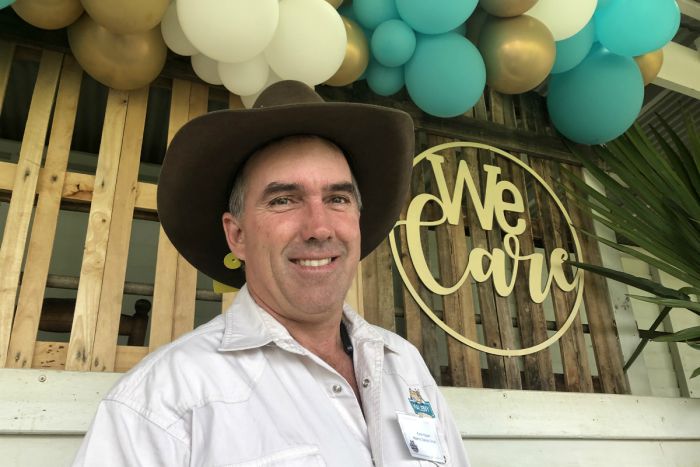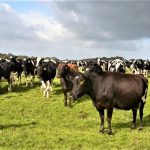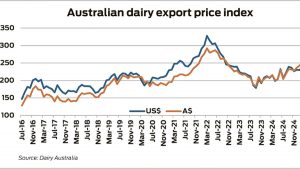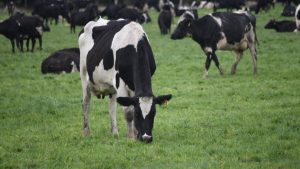
Whether it will be enough to keep about 300 remaining dairy farmers in business will depend on the coming seasons.
Despite recent rain, it will take time to reduce the spiralling cost of grain and hay due to drought.
Maleny Dairies has publicly pledged its continued commitment to its 11 suppliers launching a new campaign called ‘Because We Care’.
Owners Ross and Sally Hopper have raised the wholesale price of their milk by 12 cents a litre and adopted a ‘We Care Dairy’ logo.
The first price rise in five years has enabled the couple to pay farmers an average between 73–75.5 cents per litre — up from 64.9 cents in January last year.
“They are [Queensland dairy farmers] still disappearing at a great rate of knots,” Mr Hopper said.
“We just want to indicate to the public that we are making a big effort for our farmers and keeping the money local.
The couple has invested around $10 million in factory upgrades, including plastic bottle blowing and recycling.
“If we could, we would take on every single Queensland dairy farmer and sell Queensland milk for Queenslanders — that is what we’re about,” General Manager Peter Falcongreen said.
“The cost of operating the farms in today’s environment with grain prices is prohibitive.
“We’ve put ourselves in a position where after protracted negotiations (with retailers), we could put our price up (through Coles and Woolworths and IGA) and we’re passing the majority of that on to the farmers.”
Maleny Dairies made headlines in January after losing a tender to supply the Queensland Government’s Metro North Hospital and Health Service to French-owned Lactalis — which has since announced further cutbacks and closed Parmalat’s Rockhampton factory, sacking 47 workers.
“In 2000 Lactalis and Lion, as they do today, had custody of the Queensland dairy industry,” Mr Falcongreen said.
“There were 1,500 farms. There’s now around 300. That’s 20 years under their watch.”
Loyal customers rallied behind the family business, which has won a much smaller contract to supply Sunshine Coast Council with 600 litres of milk every week.
Relief for farmers
“This is just a breath of fresh air, it’s just marvellous,” Witta dairy farmer and Maleny Dairies supplier, Rob Cork said of the farmgate price rise.
“I think last year is probably the worst year on record in the 20 years since deregulation because of our commodity prices.
“We’re paying $700 a tonne for grain, four or five years ago it was only $330 a tonne and all the other costs associated with drought have gone up, so it’s been really tough.”
“It’ll make a big difference to us and it’s given us the incentive to milk more cows as well,” his wife Anne added.
Tough times
But farmers’ margins remain incredibly tight —73 cents per litre is the figure deemed sustainable by the Queensland Dairyfarmers’ Organisation.
Queensland is importing cheaper milk from the southern states, with demand far outstripping supply.
Norco CEO Michael Sampson said the cooperative was offering the industry’s best price to around 220 fresh milk suppliers in Northern New South Wales and Queensland.
“Norco is currently forecasting to pay its members in northern NSW and Queensland an average of 77.5 cents per litre from January to June 2020,” Mr Sampson said.
“Norco has increased its price significantly over this time to assist with the cashflow effects of the drought, and we thank our loyal customers who continue to support us, which in turn supports our farmers.”
Support for farmers
Maleny Cheese founders Sara and Markus Bucher are proud to pay an average of 75 cents a litre to four local farmers as well as sourcing milk from their family-owned ‘Obi Obi Dairies’ at Kenilworth.
“All of our farmers are in the hinterland and we have always paid above average,” Ms Bucher said.
“We are a boutique processor and without good milk, we have no business. It’s in our DNA to value and treasure our farmers.”
By January next year, the Federal Government’s Mandatory Code of Conduct will require all dairy processors to publish details of their contracts with farmers, including the price they pay per litre for milk.
ABC Rural has been told that Lactalis is offering around 72 cents a litre.
Lagging behind
Pressure is mounting on Lion Dairy and Drinks to pay more to farmers.
Formerly Japanese-owned, the company has been in a state of transition.
Last month the ACCC announced it would not oppose its acquisition by China Mengniu Dairy Company, after ‘closely considering the potential impact of competition’.
“We’re still around 10 cents behind the opposition at the moment and that’s ridiculous,” Lion supplier Joe Bradley said, at the Maleny Dairies launch.
The Dayboro dairy farmer supplies Lion Dairy and Drinks and said the company paid between 62 to 67 cents a litre to around 75 Queensland dairy farmers.
“We’ve been asking Lion to catch up.
“At the moment they haven’t and it’s very disappointing because on the current prices it’s unsustainable for us to continue.
“I don’t know what’s going to happen. Queensland is in dire straights and what Maleny has done is brilliant. They’re paying their farmers a sustainable price.”
Mr Brdaley said Lion did increase farmgate prices by 4 cents a litre on January 1, and pointed the finger at retailers for not supporting the industry.
“I can tell you the farmers are being ripped off. There’s no ifs or buts. The supermarkets can put all the spin they want in the world.
“It’s not just us — the processors are hurting too.”

























